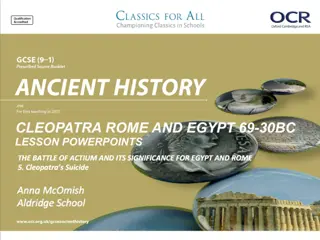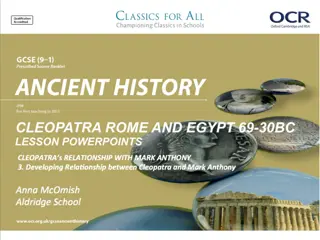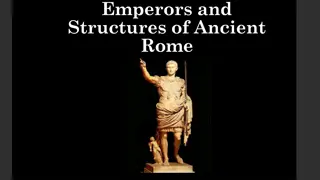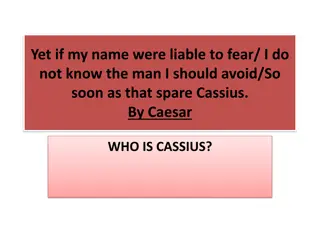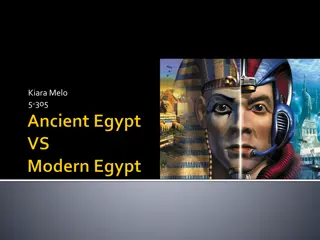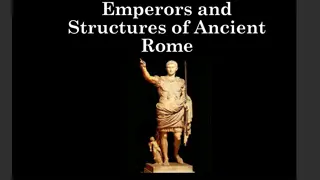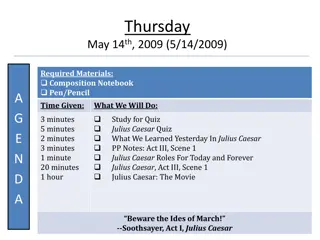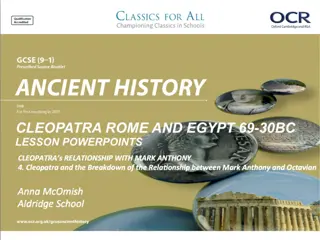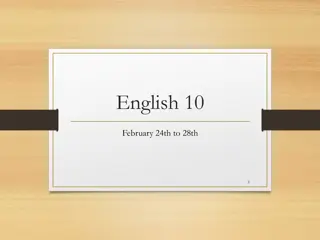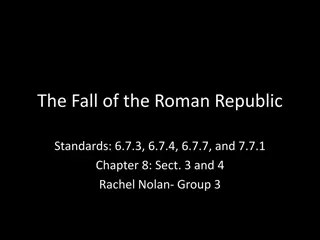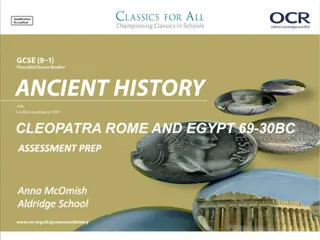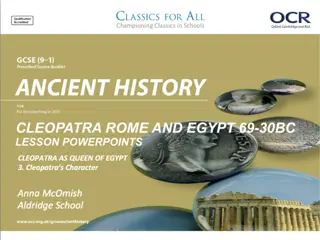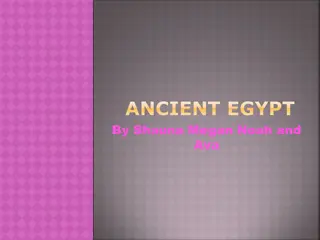The Impact of Cleopatra and Caesar's Relationship on Egypt and Rome
The relationship between Cleopatra and Caesar had significant political implications, leading to Cleopatra ruling Egypt with stability and autonomy. While beneficial for both Cleopatra and Caesar personally, the relationship faced opposition and challenges from Rome and Alexandria. This historical alliance influenced the political landscape of Egypt and Rome during that period.
Download Presentation

Please find below an Image/Link to download the presentation.
The content on the website is provided AS IS for your information and personal use only. It may not be sold, licensed, or shared on other websites without obtaining consent from the author. Download presentation by click this link. If you encounter any issues during the download, it is possible that the publisher has removed the file from their server.
E N D
Presentation Transcript
09 October 2024 The impact of Cleopatra and Caesar s relationship on Egypt and Rome (Underline date and title using a pencil and ruler) Revise, Review, Recap Who am I? 1) I drowned in the Nile 2) I was married 3 times and had many affairs 3) I was beheaded by Ptolemy s men 4) I gave Roman soldiers horrible food served on cheap plates to try to get rid of them 5) I have the largest library in the Ancient World Lesson Objectives: L.O. To understand the changes brought about by the relationship between these two key figures. L.O. To analyse the wider response to this relationship Key words/Spellings: Cleopatra, Caesar, annexe, client- monarch
TASK: Read Cassius Dio, Roman History, 44- 45. What does Dio tell us about; Problems for Caesar For the whole of the 4-month siege of Alexandria, Cleopatra remained in the royal palace as Caesar s companion, and their relationship developed. We can see the immediate impact of this relationship, as Caesar decided to NOT fully annex Egypt as a Roman Province, but to install Cleopatra and her brother (Ptolemy XIV) as a client-monarchs instead. This meant Egypt had far more autonomy than a normal client-state. This makes sense politically, as Rome was too unstable after the Caesar-Pompey civil war to be annexing new states, but the romance of the situation may also explain this decision! Nevertheless, this was not a decision (or a relationship) that was hugely popular with Rome or the Alexandrians. Each side feared too much control/influence coming from the other. 1. What was at the centre of Caesar s decision to install Cleopatra as Queen? 2. What issues Caesar still faced back in Rome? TASK 2: read p.175- (top half of) 176. Create a spider diagram/ bullet point list of the challenges and problems that Caesar faced now that he was in Egypt and had established Cleopatra as Queen. Check your cheat sheet! CHALLENGE B: How accurate do you think Dio s portrayal of Caesar s involvement with Egypt is? (5) CHALLENGE A: What can we learn from Dio, Roman History, 44 about Caesar s influence in Egypt? (5)
Benefits for Cleopatra and Caesar The relationship that developed between Benefits for Caesar Cleopatra and Julius Caesar was one that was beneficial to both of them. The evidence does seem to suggest that there was genuine emotion between them, but it cannot be denied that it also came with distinct political advantages. Cleopatra, for example, was finally given the stability she needed to rule Egypt as she saw fit! TASK: using p.176-177 (NOT including the section on the birth of Caesarion!), create a Venn diagram recording the benefits of the relationship for Cleopatra and Julius Caesar. CHALLENGE: Benefits for Cleopatra/Egypt Caesar was allowed to explore a nation he had To what extent do you agree that a benefit for Caesar, does not necessarily mean a benefit for Rome? long been interested in. Include both political, and personal, benefits.
Exam practise What was the significance of Cleopatra s relationship with Julius Caesar? (10). Question 14. 10 marks. Remember, key to success if you re asked about SIGNIFICANCE, is being able to explain WHY the event/ factor/ piece of info you re demonstrating is significant. Level 5 9- 10 Range of detailed and accurate knowledge and a developed understanding that is fully relevant to the question. (AO1) Full explanation and thorough, convincing analysis of the issue in the question, arriving at substantiated and developed judgements. (AO2) e.g. Significant for Cleopatra as she now had stability to rule as she wanted = significant BECAUSE she had long aimed to rule without her brothers, and this protected her from revolts that could threaten her power. STEP 1 Plan how many points you could make to answer this question. STEP 2 plan your explanation of WHY for each point STEP 3 decide what your conclusion will be most significant reason? Level 4 7-8 Accurate knowledge and a developed understanding that is fully relevant to the question. (AO1) Full explanation and analysis of the issue in the question arriving at substantiated judgements, but these are not consistently well-developed. AO2 Level 3 6-5 Demonstrates accurate knowledge and some understanding that is relevant to the question. (AO1) Linked to an analysis and explanation of the issue in the question but judgements may not always be made explicit. (AO2) Level 2 4-3 Demonstrates basic knowledge and some understanding that is relevant to the question. (AO1) Basic explanation of the issue in the question. (AO2) Level 1 2-1 Basic knowledge that is relevant to the topic of the question. (AO1) Little or no attempt at a very basic explanation of
Then, while everybody was feasting to celebrate the agreement, one of Caesars slaves, his barber, who noticed everything because he was so timid (he kept his ears open and was here, there, and everywhere) realised that Achillas the general and Potheinus the eunuch were hatching a plot against Caesar. After Caesar had found out, he had the banqueting-hall guarded and put Potheinus to death but Achillas escaped to his camp Caesar had the problem of being shut off from water, since the canals were dammed up by the enemy. Secondly, when the enemy tried to cut off his fleet, he was forced to resist the danger by using fire, and this spread from the dockyards and destroyed the great library. Thirdly, when a battle arose at Pharos, he jumped from the pier into a small boat and tried to go to the aid of his men in their struggle, but the Egyptians sailed up against him from every side so that he threw himself into the sea and with great difficulty escaped by swimming. It is said that at this time too, he was holding many papers in his hand and would not let them go, but he held them above water with one hand and swam with the other. But finally, after the king had gone over to the enemy, Caesar marched against him and conquered him in a battle where many died and the king himself disappeared. Then, leaving Cleopatra on the throne of Egypt Plutarch, Life of Caesar, 49 Who does Caesar leave in charge of Egypt and what do we know are the consequences of his visit?! What supposedly happens to the library of Alexandria during the fighting and how does Caesar protect his papers? From whom does Caesar hear the rumour that Pothinus was plotting his death?


